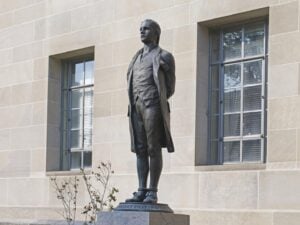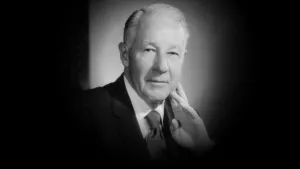Before this one, the last year that ended in “13” turned out to be one of the unluckiest in American political history. Now comes word from astronomers that a recently discovered comet is heading our way in 2013, predicted by some to blaze ten times brighter than a full moon. If you’re afflicted with triskaidekaphobia (fear of the number 13), or if you believe the old myth that a comet is a bad omen, you’re already looking forward to 2014.
I’m not superstitious, but I earnestly hope 2013 doesn’t bring us anything as calamitous as 1913 did. It was a disastrous year that we’re still paying a hefty, annual price for a full century later.
The presidential election of 1912 featured three main contenders: Woodrow Wilson, the Democrat; William Howard Taft, the Republican incumbent; and former President Theodore Roosevelt, the candidate of the Progressive (or “Bull Moose”) Party. Teddy remains an overrated politician, but he was a colorful and commanding figure whose daughter Alice summed him up well: “My father always wanted to be the baby at every christening, the bride at every wedding, and the corpse at every funeral.” His vanity and animosity for Taft handed the election of 1912 to Wilson, arguably the worst president of the 44 who have held the office. His first of two dreadful terms commenced in March 1913.
Wilson’s racism and philandering are now legendary among serious historians. As president of Princeton University, he barred blacks from the campus. As President of the United States, he ordered the segregation of all departments within the executive branch and appointed ardent segregationists to high positions. He covered up his adulterous affairs while posturing as a man of personal integrity. He led us into a major war he had promised to avoid, then campaigned for a peace treaty that all but guaranteed the next great conflict. He locked up political dissidents right and left as he trampled on the Constitution’s guarantees of speech, assembly, and press freedoms. His wartime economic controls were hideously stupid and counterproductive.
1913 would rank as an unlucky year if all that had happened was Wilson’s ascendancy to the presidency. Three things he helped give us that year, however, make it unforgettable in the most pejorative sense: the income tax, the direct election of U.S. senators, and the Federal Reserve System.
On February 3, a month before Wilson took office, the 16th Amendment to the Constitution was ratified. Strongly supported by Wilson, it authorized the federal government to impose and collect a tax on personal incomes. Subsequent legislation set the top rate at a mere 7 percent. Married couples were only taxed on income over $4,000 (about $90,000 in today’s dollars). When Wilson left office eight years later, the top rate was more than ten times higher.
The income tax granted politicians enormous power to reward friends, punish enemies, and redistribute wealth. It morphed into a more oppressive, productivity-sapping nightmare than even its most ardent opponents had warned Wilson against. Today’s massive IRS bureaucracy and incomprehensible 73,000 pages of tax rules, regulations, and IRS rulings are Wilson’s illegitimate children, born in 1913.
On April 8, the 17th Amendment to the Constitution was ratified, also with Wilson’s longstanding endorsement. Instead of being appointed by state legislatures as established by the Founders, U.S. senators would thereafter be chosen by popular vote. Since that process seems “democratic,” few people question the amendment’s wisdom today. The sad fact is that it seriously eroded the balance between state and federal governments to the great detriment of the former. It helped make the states into administrative drones for the queen bees in Washington, D.C. One example of its baleful influence: The explosion of unfunded federal mandates could never have occurred if U.S. senators were directly accountable to state legislatures.
The late columnist Tony Blankley wisely advised, “The most efficient method of regaining the original constitutional balance is to return to the original constitutional structure. If senators were again selected by state legislatures, the longevity of Senate careers would be tethered to their vigilant defense of their state’s interest—rather than to the interest of Washington forces of influence.” Repealing the 17th Amendment, he argued correctly, might be the best way to enforce the 10th Amendment, which states, “The powers not delegated to the United States by the Constitution, nor prohibited by it to the States, are reserved to the States respectively, or to the people.”
On December 23, Wilson’s signature enshrined into law the Federal Reserve Act, creating a central bank and more economic mischief than any other federal initiative or institution in the last 100 years.
Imagine if Congress had hired a private company to manage the nation’s money supply, protect the value and integrity of the currency, promote full employment, and iron out the boom-bust cycle. Imagine further if that company went on to generate a Great Depression, a slew of recessions and volatile swings in employment, and a dollar worth perhaps a nickel of its former value. We’d have long ago fired the company and jailed its executives. Yet that’s precisely the legacy of the Federal Reserve.
Without the 16th and 17th Amendments and the Federal Reserve, it’s inconceivable that the federal government could have grown from less than five percent of GDP in 1913 to nearly 25 percent in 2013. Were it not for those three gremlins, how many fewer trillions might our unconscionable national debt be? The toll on our liberties is also incalculable but surely considerable. It’s no exaggeration to say that 1913 is the year that keeps on stealing.
Other things happened in 1913, too. The British steamship Calvados vanished in the Marmara Sea with 200 hands on board. Vincenzo Perugia was arrested for trying to sell the “Mona Lisa” in Italy after having stolen the painting in Paris two years before. The temperature in Death Valley, California, hit 134 degrees—still the highest temperature ever recorded on the planet. The First Balkan War ended on May 30, just in time for the Second Balkan War to begin on June 29. In Russia, the Romanovs celebrated the 300th anniversary of their family’s accession to the throne. And in Sheffield, England, Harry Brearley invented stainless steel. There were no reports of any comet sightings.
In American history, 1913 should go down as a year that will live in infamy. But it wasn’t the Japanese who bombed us that year. It was our own duly elected officials.
Lawrence W. Reed is the president of FEE. For further reading, the author recommends these selections from the archives of FEE’s journal, The Freeman:
- “The Relics of Interventionism—Progressivism” by Clarence B. Carson, May 1982
- “Original Intent and the Income Tax” by Raymond J. Keating, February 1996
- “The Progressive Income Tax in U.S. History” by Burton Folsom, May 2003
- “Banking Before the Federal Reserve: The U.S. and Canada Compared” by Donald Wells, June 1987
- “Who Owns the Fed?” by Warren Gibson, April 2011
- “Fractional Reserves, Legal Tender, and Central Banking” by Steven Horwitz, July 2011
- “Wilson’s War: How Woodrow Wilson’s Great Blunder Led to Hitler, Lenin, Stalin, and WWII” by Richard Ebeling, July 2010
- “Theodore Roosevelt: Big Government Man” by Jim Powell, February 2010




